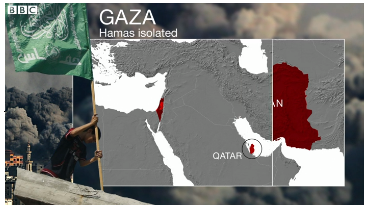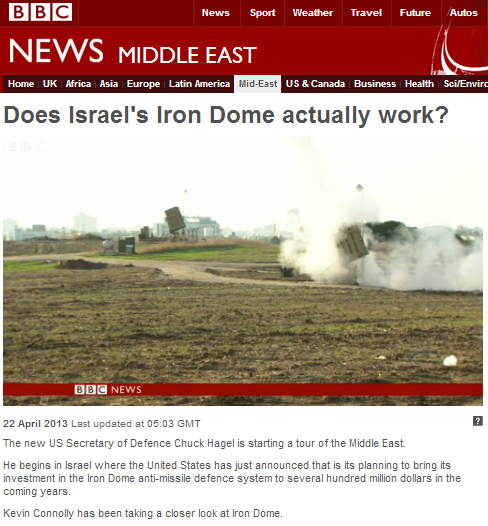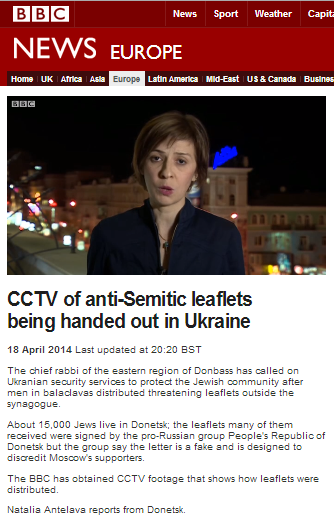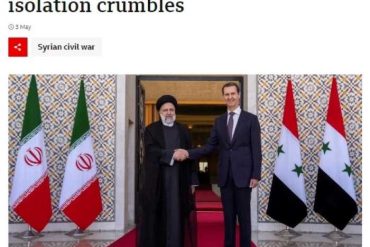If we take a ‘zoom out’ look at BBC reporting since July 8th on the current hostilities in Israel and the Gaza Strip, one obviously very significant factor is its almost exclusive focus on the micro.
BBC audiences have seen, heard and read ample reporting at ground level, with the overriding emphasis being the portrayal of the effects of the conflict on civilians in the Gaza Strip and the majority of still and filmed images showing destroyed buildings, civilian casualties, hospitals and residents who have fled their homes.
However, as we have noted here previously, audiences have seen, read or heard very little indeed about the terrorist activities of Hamas and other organisations which initiated these hostilities. Apart from the occasional tepid interview with a Hamas spokesman and rare vague references to “gunfire” or “rockets fired”, BBC audiences could quite well reach the mistaken conclusion that this is a story exclusively about Israeli military strikes and civilians.
But zooming out even further, we see that there is one word in particular which has been remarkably absent from all BBC reporting and that word is Iran. The issue of where many of those missiles currently being launched at Israeli civilian communities came from apparently fails to arouse the curiosity of BBC reporters, who have put great effort into promoting the theme of “homemade rockets“. The subject of Iranian training and financial support for Hamas and the Palestinian Islamic Jihad has been completely absent from the picture presented to BBC audiences, meaning that this conflict is being framed solely in terms of a powerful Israeli military assault on an impoverished and beleaguered Palestinian civilian population.
One rare occasion upon which the word Iran did make it into BBC coverage of Operation Protective Edge was seen in a backgrounder report produced by the BBC’s security correspondent Frank Gardner, aspects of which were previously discussed here. That July 22nd report purported to explain to BBC audiences “why is Middle East truce so hard to broker?” and in it Gardner informed them:
“Three years ago Hamas had more allies in the region. Now the whole political map has changed. Egypt has switched rulers from Morsi’s Muslim Brotherhood to the secular Sisi. Syria and Iran were once big supporters of Hamas but relations have been strained by Hamas’ sympathy for the rebels in Syria. Qatar is now the sole big benefactor for Hamas, but Qatar is not an acceptable mediator for the Israelis.”
The graphic accompanying Gardner’s voice-over shows Iran being erased from the map of Hamas supporters under the title “Hamas isolated”, with the clear suggestion to viewers being that Hamas no longer enjoys Iranian support.

But does Gardner’s backgrounder provide BBC audiences with an accurate view of the situation? One person who would probably disagree with this BBC analysis is Ahmad Jibril of the PFLP-GC who recently told Al Manar TV – run by Iran’s proxy in Lebanon Hizballah – the following.
“After 2008, hundreds of our young people left the Gaza Strip for Syria, Lebanon, and Tehran, to train and to learn how to improve these weapons,” Jibril said referring to Hamas’s missiles. […]
… Jibril described the route by which arms were smuggled from Syria to the blockaded Gaza Strip, explaining that the armed [arms] from Iran can’t be transferred by the Persian Gulf because it “is under surveillance.”
“We transferred [the missiles] from the airports in Damascus to Khartoum, from Khartoum to Port Sudan, and from there to the Sinai. From the Sinai, they were transferred via tunnels to the Gaza Strip,” the Palestinian faction leader explained. “The brothers in Hezbollah established cells of Bedouin and so on in the Sinai Desert. You could transfer the weapons to them, and they would get them into Gaza.” “
And it seems that the Iranians themselves might take umbrage at Gardner’s suggestion that Hamas no longer enjoys their support, with their deputy foreign minister Hossein Amir Abdollahian having told the same Hizballah TV station on July 27th that:
“Even under the worst conditions, Iran maintained good ties with Hamas. During the recent crisis, we were in direct contact and held consultations with Hamas, with Ismail Haniya, and with Hamas Political Bureau head Khaled Mash’al.
Two days ago, the Iranian foreign minister called Khaled Mash’al and talked with him for 20 minutes. This was a very important and productive conversation.
We regularly support Hamas and the Islamic Jihad and all factions of the Palestinian resistance.”
It seems too that Iranian intentions are not limited to the Gaza Strip.
“A former adviser to Iran’s defense minister said this week that Tehran would seek to arm Palestinians in the West Bank with “strategic weapons” including missiles to target Tel Aviv and Haifa. […]
“A new front must be opened from the West Bank, after it has been armed, especially with missiles,” Mousavi said in comments relayed by the Middle East Media Research Institute, “because we know very well that the distance between the West Bank and Tel Aviv, Haifa, and other areas is much shorter than the distance from Gaza. Therefore, simple means are required. There is no need for long-range missiles. Short-range missiles can change the entire picture in the occupied lands.” “
Those remarks should be viewed in conjunction with a comment (not reported by the BBC) made recently by Khaled Masha’al at a press conference in Qatar.
“Mashal said the Gaza-based group “would not accept an initiative that does not include lifting the blockade. Today Israel is worried about what happened at Ben Gurion Airport. Do you want a blockade in return for the blockade? Today the resistance in Gaza can blockade you, in the future it will from the West Bank.” ” [emphasis added]
The BBC’s failure to adequately inform audiences of the Iranian factor in this conflict (and also the Qatari one; an entire topic in itself) clearly means that it is falling short of its obligation to “[b]uild a global understanding of international issues”. But that failure also has an additional, more immediate effect.
The past few days have seen extensive BBC amplification of Hamas’ pre-ceasefire demand to remove border restrictions imposed by Egypt and Israel in response to the actions of terrorist organisations in the Gaza Strip. Yet not one BBC journalist has made any real effort to place that demand within the crucial context of the rearming of terrorist organisations in the Gaza Strip, the import of dual-use goods and building materials for the reconstruction of attack tunnels and the shared agenda of terrorist organisations such as Hamas and the Palestinian Islamic Jihad and other actors in the wider region.
That’s one very serious ‘oversight’ for an organization which claims to set the standards for international journalism.




